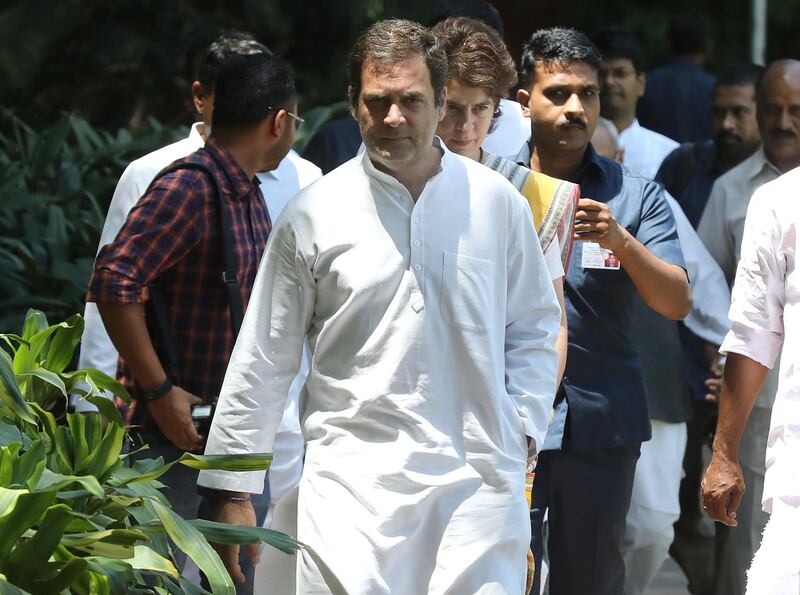One-hundred-and-thirty-four years after it was founded, the Indian National Congress – the country’s grand old party, the party that helped win India its freedom from the British, the party that has ruled India for nearly 54 out of its 72 years – is deep in the throes of an existential crisis.
It is difficult to say precisely when this began. It may have started at some point between 2009 and 2014, when, during its most recent spell in government, corruption scandals began to tumble out of its closet. It may have started in May 2014, when the Bharatiya Janata Party (BJP) trounced the Congress in the general election, reducing it to an all-time low of 44 parliamentary seats.
Or it may be as recent as May this year, when, despite a struggling economy, the BJP registered an even bigger victory, allowing the Congress a mere eight-seat improvement in its tally.
But the most symbolic marker of the party's uncertain future came earlier this month, when Rahul Gandhi, the president of the Congress, resigned his post. Mr Gandhi, 49, took responsibility for the Congress's poor electoral results as he quit. He also refused to nominate his successor. "While it is important for someone new to lead our party, it would not be correct for me to select that person," he wrote in his resignation letter.
By stepping down, Mr Gandhi leaves the Congress with a vacuum it is profoundly unfamiliar with. For most of its modern history, the party has been led by the Nehru-Gandhi dynasty. The most recent spell when someone outside the family presided over the Congress was in 1998, before Mr Gandhi’s mother Sonia took the party’s reins.
The Congress has, therefore, been cast in the image of the dynasty. Its hierarchies orient themselves around the Gandhis. Its ranks are filled with loyalists. It functions according to the whims of the family.
And now, suddenly, there are no Gandhis at the top.
To be sure, Mr Gandhi will still wield enormous power within the party. So will his mother and his sister Priyanka Vadra. But Mr Gandhi’s insistence that the next president of the Congress be chosen from outside the family has opened the possibility of a great transformation for the party.
What that transformation will be is still open to question. Without the family’s centrifugal force, the Congress might break up into smaller parties, each revolving around its own power centre. There may be no Congress at all, at least in the way we know it today.
Alternatively, the party may go through a long period of turmoil and reform to emerge strengthened. Having rid itself of the dynasty that dominated it, a renewed Congress might also be able to renovate its policies, its personnel, and its electoral strategies. For the first time in decades, it may become a party with a truly democratic ethos to its internal decision-making process.
Or maybe there will be no transformation at all. Perhaps, after a sufficient time away from the presidency of the party, Mr Gandhi will return, seemingly in response to his colleagues’ clamour for his leadership. Or the presidency will fall to his sister Ms Vadra, and pass on thence to one of her own children, keeping the Congress in the family.
What is clear is that, while the party sorts through its troubles, it will leave a giant hole in Indian politics.
The BJP’s rout of its rivals in the last election has given it a massive parliamentary majority. Even by cobbling together the votes of every other party that opposes the BJP, the Congress could not hope to defeat legislation that the government wishes to push through.
But a Congress occupied with its own demons will cede the public sphere of debate to the BJP, unable to meaningfully counter the government's rhetoric or actions in the press or in policymaking circles. The BJP's ideological campaign is well-mounted and powerfully driven as it is. For there to be no meaningful opposition to these reactionary ideas of nationalism or violent chauvinism would be to allow these ideas to easily fill the minds of India's citizens.
For this reason, critics of the BJP will find themselves torn over what they hope for by way of the fate of the Congress.
Do they wish that the Congress reinvents itself without the Gandhis, even if that takes years, during which the BJP gets more powerful? Do we hope for the obliteration of the Congress altogether, so that those energies may be taken up by other parties? Or do we hope, for the sake of temporary resistance to the BJP, that the Congress finds a member of the Gandhi family to lead it through these decisive years in Indian history?
It’s a difficult predicament, and supporters of the health of Indian politics must be careful about what they wish for.





